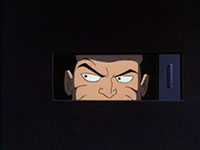|
 You
don’t go to Batman: The Animated Series for a sophisticated
sociological examination of the problem of crime and its punishment: it's
a cartoon action show, after all. And you don't go to BTAS for raw exploitation
fare, either: it may be an action show, but it's better than that (thankfully).
And you certainly don't go to it looking for some thumbfumbled attempt
to combine the two. So heaven help you and the rest of us when it comes
to "Lock-Up." You
don’t go to Batman: The Animated Series for a sophisticated
sociological examination of the problem of crime and its punishment: it's
a cartoon action show, after all. And you don't go to BTAS for raw exploitation
fare, either: it may be an action show, but it's better than that (thankfully).
And you certainly don't go to it looking for some thumbfumbled attempt
to combine the two. So heaven help you and the rest of us when it comes
to "Lock-Up."
It has a heady theme,
that's for sure, but it's one that a Batman writer plays with at his peril.
It's about the ethics of vigilantism, and, in truth, the ethical dimension
of the Batman universe does not bear close scrutiny. I don't mean that
that universe is somehow confused or that it embodies an immoral view.
I only mean that it clutches at but then fudges a deep and an important
issue: How can the good of the individual and the good of society be reconciled
when they conflict? In this regard, Batman, though a product of the early
twentieth century, is a pre-modern figure, even pre-classical one. The
Greeks, after all, were keenly aware of the problem of how to reconcile
the needs and interests of both the indvidual and society (though they
had no solution), for their founding poetry in Homer had harked back to
a pre-political age when men were loyal only to themselves and to other
men and bent to no civil authority. And yet the Greeks had also fashioned
a flourishing political regime that required its citizens to compromise
for the social good. Thus the paradox: Where does justice lie when the
good of an individual conflicts with the good of the city that raises
him above a merely selfish existence?
The issue is particularly
acute in today's bureaucratized world. Economically, politically, sociologically,
we are far removed from a place where each man is his own master and bound
only to do what is right by his own conscience. And yet that is exactly
what Batman does. He is not part of the law and is moved by his own history
and ideals. That is why he appeals to us: he is neither a policeman nor
a lone gunslinger, but a man trying to do what is right.
His extra-legal existence,
however, is only justified by the borderline collapse of law and order
in Gotham City and by the inability of the established authorities to
deal with the looming archfiends of Arkham. Lyle Bolton recognizes this
and follows the trail blazed by Batman. His diagnosis is more radical,
but only in degree rather than kind: true social order has already vanished,
he argues, and what is left actually masks and protects the violent anarchy
that has replaced it. He is Batman in the raw, unencumbered by the need
to preserve appearances, and it is no wonder that in their fights Batman
is oddly tongue-tied and unable to argue back. They disagree only on facts,
not on principles.
Not only Batman flinches
from this awful vision. The script does, too. Unable to discriminate between
its hero and villain on principled grounds, it ham-handedly turns Bolton
into a hulking sadist with only two lines: "Scum is everywhere"
and "Batman should be on my side." This resort to cheap melodrama
is extremely irritating, as it robs us of an interesting antagonist as
well as riding roughshod over the ambivalent aspects of the vigilante
ideal. There are some effective bits early in the episode when Bolton
is still loose in Arkham, and Robin makes some cheerily cynical observations.
But the situation was unpromising from the very beginning, for the differences
between Batman and Lock-up cannot be comfortably explored in the space
of twenty minutes. And I doubt the conflict is one that can be resolved
in the pat and satisfying way that the action cartoon genre requires.
Antigone, you may recall, raised the same fundamental conflict
of outraged conscience meeting outraged law, only to abandon the search
for reconciliation in agonized despair.
|


